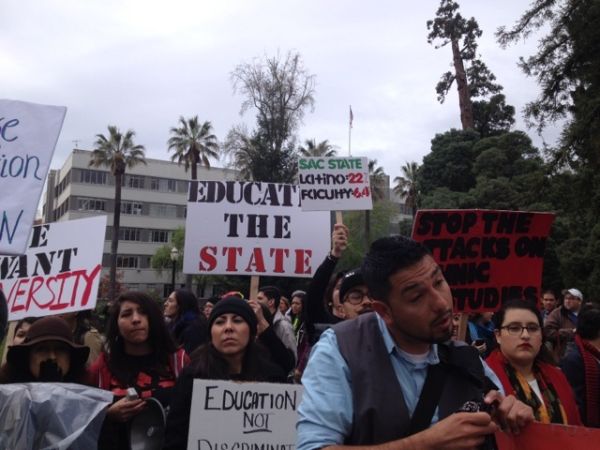Public colleges and universities united for the statewide student march

Students gathered in front of the Capitol demanding changes to higher education during the annual March in March.
March 4, 2014
“Students united, will never be divided,” was chanted by Sacramento State students Monday, along with others from California public colleges and universities during a march to the State Capitol in demand of student needs.
The “March in March,” is hosted annually by the Student Senate for California Community Colleges and supported by the California State University and University of California student associations.
The event’s goal is to bring awareness to student’s needs from across California to the state legislator while teaching and empowering student leadership skills.
Several Sac State organizations, such as Students for Quality Education, Movimiento Estudiantil Chican@ de Aztlan and Mujeres Ayudando la Raza, attended the march in support of three common goals revolving around diversity.
They include sustaining the ethnic studies department, diversifying the amount of full-time faculty on campus and increasing the students of color enrollment rate.
Ethnic studies and sociology major Christopher Sanchez marched on behalf of Students for Quality Education and said CSU ethnic studies departments are in jeopardy.
“CSU Long Beach minimized their ethnic studies department into a program and there is no longer a Chicano studies major,” Sanchez said. “It is only a matter of time until Sac State faces similar problems.”
Sanchez said it is important to look at how and why Long Beach did this to know who to speak to before it becomes a trend.
San Jose State, CSU Bakersfield and Stanislaus are other campuses where the ethnic studies major is being eliminated, is having classes reduced or is being subsumed into other liberal arts programs, according to the Los Angeles Times article “Cal State’s ethnic studies programs falter in changing times.”
Social work major Marcela De La Cruz said she wants to send a message to legislators about how important it is to keep ethnic studies.
“I think ethnic studies are important because they make students aware of different culture’s viewpoints and should be kept as requirement for general education,” De La Cruz said. “From kindergarten to high school, we learn about our country’s history through European viewpoints and we need to be aware of others.”
CSU administrators said they are reducing ethnic studies programs and courses because of “uncontrollable and necessary” budget cuts and low enrollment rates, according to the article “A Loss of Ethnic Studies Contributes to Historical Amnesia,” by Jimmy Franco.
Alumna Yeimi Lopez said students need a system that focuses on preparing them for the job market and not one that focuses on profit.
“CSUs are sending the message they want to charge us more for a lower quality education and they want us out fast,” Lopez said. “When I was in school, I went from paying $2,500 to $5,000. During this time the school was retiring professors without replacing them while offering fewer classes.”
Sociology major and Movimiento Estudiantil Chican@ de Aztlan member Eddie Triste said when departments like ethnic studies are taken away, the diverse faculty (members) also disappear.
“For people who think Sac State is diverse, they need to analyze it more and observe the faculty,” Triste said. “When looking at our sociology department, there is only three Chicano Latino professors. We should strive to have an equal population.”
The Sac State fact book shows there were a total of 1,479 faculty in 2013 and only 23.7 percent were of different ethnicities, 4.9 percent African-Americans, 1.1 percent Native Americans , 11.4 percent Asian/ Pacific Islander and 6.4 percent Latino.
Triste said there have been studies showing how students of color who have teachers of color are more likely to succeed.
Several professors on campus like Elvia Ramirez and Manuel Barajas have done studies on how diverse faculty is critical for promoting academic success among underrepresented students.
Ethnic studies Professor Elvia Ramirez found Latino/a undergraduate students are more likely to approach diverse faculty for letters of recommendation for graduate school. She said many students had few professors they could relate to or felt comfortable approaching for mentoring and advice.
Triste said he hopes this march will enlighten legislators and encourage students to become long term activists to defend education.






















































































































